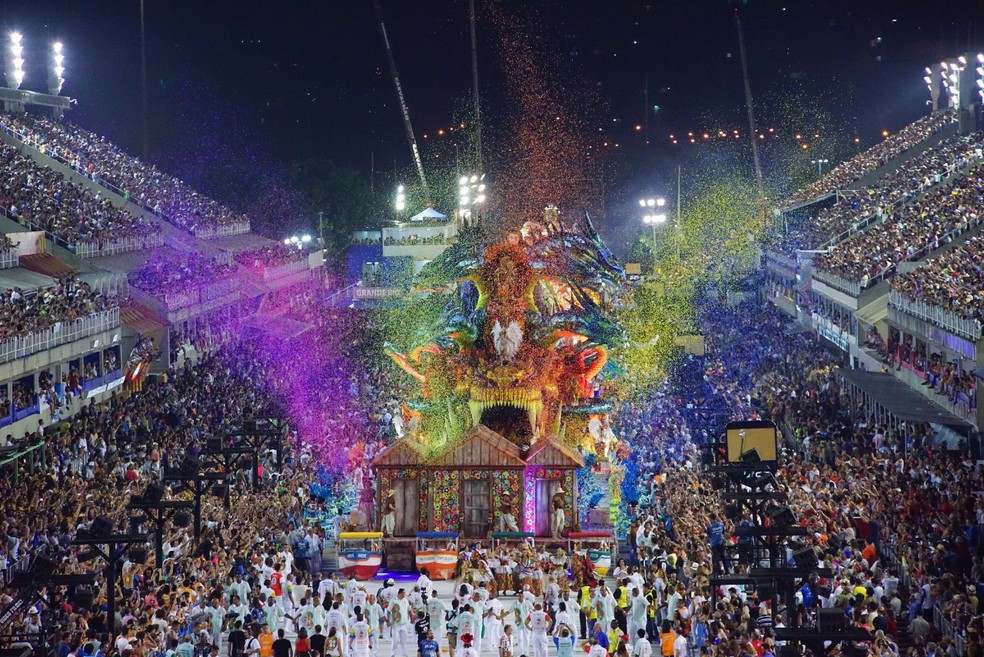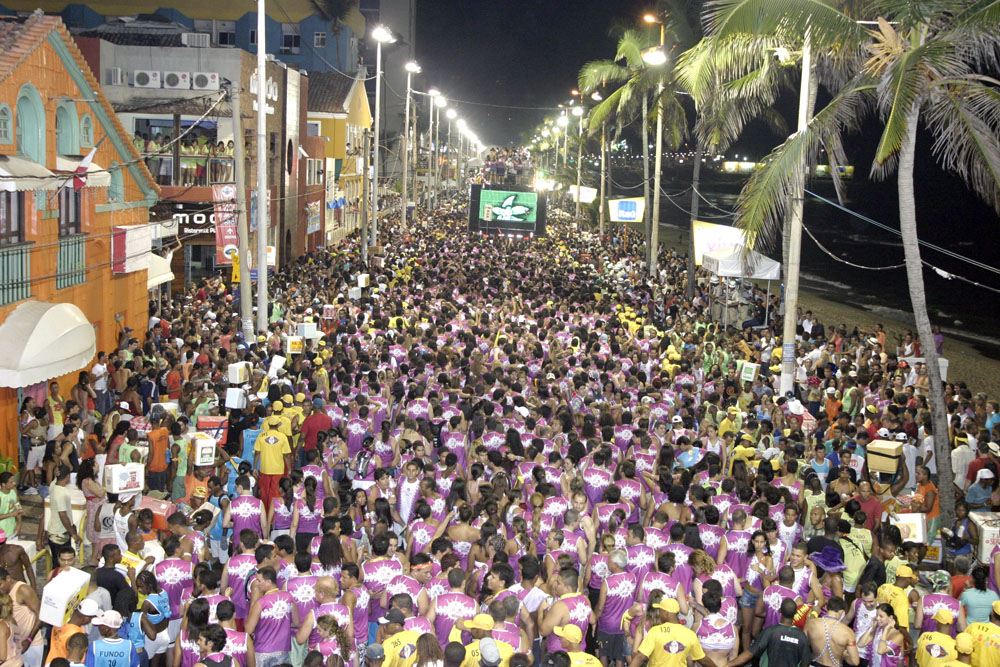RIO DE JANEIRO, BRAZIL – The pandemic triggered by the novel coronavirus has stopped the world. The service, trade, and industry sectors have been severely impacted, and the reflection of this shutdown should persist until a potential vaccine against Sars-CoV-2 is approved and widely distributed.

Carnaval – Brazil’s largest festival – will also feel the pinch of the pandemic. This year, at least R$8 billion (US$1.6 billion) were raised during Carnaval in the country’s economy. This represented an increase of 48 percent compared to the preceding year and a record, according to the National Confederation of Commerce (CNC).
A higher projection of economic turnover for the tourism sector in 2021 is compromised, given that the W.H.O. declared the situation of a worldwide pandemic by the coronavirus in March, after Carnaval in Brazil.
With no vaccine to immunize the population, the event’s host cities are discussing the festival’s cancellation or postponement. Bahia and Rio de Janeiro have yet to define the fate of the samba school and street block parades in 2021. In São Paulo, Mayor Bruno Covas announced the postponement of Carnival 2021 on Friday during a press conference: instead of February, the event will take place in late May or early July, thus ruling out its cancellation. Both the capital’s League of Samba Schools and representatives of major street blocks were involved in the decision.
This year, 15 million people spent R$2.75 billion in the São Paulo capital’s street festivities, which was an economic gain of R$227 million for the city, and an increase of 31 percent compared to 2019 and 400 percent compared to 2018.
The revenue raised at the Anhembi Sambadrome were more modest, yet significant: in 2020, R$227 million was generated, compared to R$220 million in 2019 and R$180 million in 2018.
In an interview, André da Silva, financial director of the Gaviões da Fiel Samba School, said that the school will only parade the avenue when it is safe from the coronavirus. “If we have a vaccine to immunize the population, the event becomes feasible with an audience.” Prevented from making the preparations inside the shed due to the pandemic, Gaviões follows the calendar planning by working at a distance. A new approach is being implemented, involving the participation of components – in this case, the Harmonia component – both through meeting apps and online communication. The execution of the operational aspect such as the production of floats and costumes is stopped, which affects at least 200 jobs.
The financial impact was also felt in other areas of Gaviões, which as an organized fan group hosted at least 5,000 people weekly on its block, contributing to the school’s funding with the sale of food and beverages, sports activities, drum classes, and products from its official store. To reduce expenses, the staff was dismissed and the directors work as volunteers. With no fixed sponsors, the school tries to engage with companies, which, according to Silva, “is difficult”.
Meanwhile in Rio, the Independent League of Samba Schools (LIESA) agreed that the decision to postpone or cancel the Carnaval parades should only be taken in September. According to representatives of the (top tier) Grupo Especial Schools, the event should only take place if health authorities confirm that a vaccine or drug will be administered to remove the danger of Covid-19 infection. “We will remain in tune with the Federal, State and City Governments of Rio de Janeiro, awaiting official instructions regarding the procedures to be adopted in the coming months,” said Jorge Castanheira, president of LIESA.
“No vaccine, no Carnaval. We have to prioritize the population’s health,” said Fernando Fernandes, president of the Vila Isabel school.
So far, eight schools in Rio have announced their plans. Vila Isabel, which will honor Martinho da Vila, has had its costume depository closed and has been working on a home-office system since the pandemic began. In an interview, the president of the Vila, Fernando Fernandes, was categorical: “No vaccine, no Carnaval. We have to prioritize the population’s health”. According to him, in a typical schedule, this would be the time when the school would be in its assembling stage, producing the costume models.
Despite working remotely, some stages, such as the floats plans, the samba synopsis, and the production of costumes, have already been completed. Less than seven months before the official Carnaval date, Fernandes says that Vila Isabel is ready and organized to step onto the avenue should there be a vaccine by then.
“This pandemic can’t be allowed to introduce disease into the community, to our members.” In order to ease the budget blow felt by casual workers who rely on Carnaval to survive, Vila Isabel has been helping with basic food baskets. The school’s seamstresses have also joined forces by creating uniforms and masks with fabrics donated to the Rio Saúde hospital. “This is the time to unite. We can’t just think about Carnival. Now it’s time to help each other,” he said.
As there is still no resolution on Carnaval in 2021, Rio’s City Hall has been considering alternatives for various scenarios and has progressed on issues that are unrelated to the event. “Since Carnaval is a national holiday, it also involves other sectors, not only the municipality, so it’s a much broader discussion, which involves the results of scientific studies and the development of a vaccine,” said the city’s tourist bureau Riotur. The use of public transportation is also a reason for concern, as it increases on celebration days.
Riotur said the state capital raised R$4 billion during Carnaval this year. In 2019, it was R$3.78 billion, an increase of 26 percent compared to 2018. Considering the street blocks, mega-blocks, Sapucaí, Intendente Magalhães (the base Carnaval for the second-tier schools) and the 77 popular stages spread throughout the city, 10.7 million people attended Rio’s Carnaval events in 2020, with 2.1 million tourists – 77 percent Brazilian and 23 percent from abroad, which was a growth of 31.2 percent compared to the same period last year.

Rio Hotel Sector
Some 66 accommodation establishments, including hotels, hostels, and lodges, are temporarily suspended in the Rio de Janeiro capital. When surveying a projected recovery in the accommodation sector, a study points out that the majority of the businesses surveyed, 56.06 percent, are not working with forecasted date; 25.76 percent intend to reopen their doors in August; 10.60 percent in September; 1.50 percent in November; and 6.08 percent in 2021.
The survey also found that six establishments closed down permanently in the city. Still according to the sector, the last four months have added an estimated R$720 million loss to Rio de Janeiro’s hotels due to the Covid-19 pandemic.
The survey is part of the IPH-RJ – Rio de Janeiro Hospitality Industry Performance Index, prepared by the syndicate, the official representative for the hospitality industry and in charge of disclosing data on the sector. The sector recorded a 93 percent occupancy rate last Carnaval.
According to the president of Hotéis Rio (Lodging Facilities Syndicate of Rio de Janeiro), Alfredo Lopes, the pandemic has caused a giant loss to the sector, and the reopening should be assessed daily since a hasty reopening of services could be worse. “Imagine opening all the hotels and within a short time we have a lockdown,” he ponders.
“The reopening should be slow, and it should be for families traveling in their own vehicles for fear of the virus at airports, but I believe that the national market will react admirably once traveling is resumed. Domestic tourism will itself provide a boost. Similar to what happened in Argentina,” Lopes said.
He added that a less negative scenario for Carnaval would be its postponement, as samba schools would struggle to mobilize their depots in time, if the original date on the official calendar had been maintained.
“There’s no way to have Carnaval without crowds, and it will most likely be postponed. This is the greatest event in Rio de Janeiro. From the Federal Government to the Globo biscuit vendor, everyone profits from the festival,” said Alfredo Lopes.
In São Paulo, the pandemic’s effect should not have a substantial impact on the hotel sector, although a possible retraction in occupancy would be expected if Carnival were to be canceled, said the Brazilian Association of the Hotel Industry of the State of São Paulo (ABIH SP). During the long Carnival and New Year holidays, the most popular tourist destinations in the state of São Paulo are the coastal and interior resorts. It is expected that after the pandemic, most hotels on the coast and in the state’s interior will maintain their traditional occupancy rate (which varies from 90 to 100 percent) recorded in previous years.

Bahia
Meanwhile in Salvador, one of the most traditional capitals for the Brazilian Carnaval, the celebration is also expected to be postponed. ACM Neto, the mayor of Bahia’s capital, said at a recent press conference that “if there is no vaccine or clarity regarding collective immunity until the month of November, then it may be the case that the municipality lacks the safety factors to maintain Carnival.”
Both trade and tourism are estimated to have raised R$2.2 billion during Carnival this year, according to the National Confederation of Trade in Goods, Services and Tourism and the Brazilian Institute of Geography and Statistics (IBGE). According to the president of the Brazilian Association of the Hotel Industry of Bahia – ABIH-BA, Luciano Lopes, Carnival’s five days represent a turnover of R$156 million (average of the past three years) for the sector, with a 95 percent occupancy and peaks of up to 100 percent. This figure represents between 12 and 13 percent of the year’s turnover, and is the most profitable period.
Source: Exame

